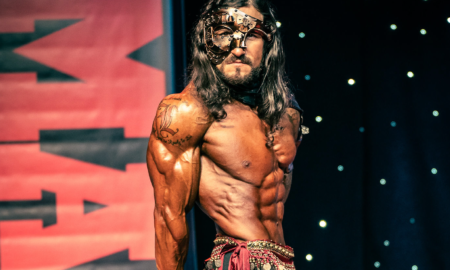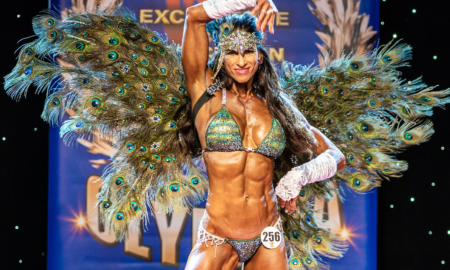


As an old-school bodybuilder I’ve seen every trend in bodybuilding, fitness, nutrition and health since 1977. Back then bodybuilding knowledge was harder to come by. There were a few magazines to learn from—Iron Man, published by Peary and Mabel Rader, was my favorite.
Gyms were small and scarce. Bodybuilding was an obscure, cult activity until the late ’80s and early ’90s. To a great extent, information about contest prep and its related nutritional protocols were handed down from generation to generation. It was not unlike ancient villagers teaching their young to hunt and gather.
Sometime in the past 10 to 15 years the concept of the bodybuilding guru came to prominence. The word guru is a catchall phrase, with some injected sarcasm, to describe certain nutrition and training coaches. They may offer further services in the areas of posing, bikini stage presentation and so on. Gurus, with their inherent need to be recognized for their supernatural knowledge and mystical understanding of exercise and nutritional physiology, often write for magazines or Internet media.
Let’s not confuse a guru with a mere coach or nutritionist. Gurus wish to portray an aura of all-knowing wisdom. They convince their followers that they have the secret that other coaches and even less-gifted gurus possess. The game works like this: A guru works his way in with a few genetically blessed bodybuilders who are destined to become top pros—athletes who would be winning shows if they were coached by their deceased grandmothers.
Scores of not-so-blessed bodybuilders flock to the guru in hopes of getting a physique like the gifted athletes have. That’s how gurus make a living—from rank-and-file bodybuilders. In truth, the gurus often handle the famous bodybuilders for free because it’s the best advertising for getting an endless supply of average athletes.
I have witnessed one of the most renowned gurus in the bodybuilding world administering precisely 11 almonds to a top pro exactly 12 minutes before he went onstage. The specificity of his prescribed snack had the implied precaution that if the guy ate 13 almonds two minutes earlier, the whole contest preparation could be in jeopardy. That is, of course, completely absurd.
My wife Nancy, no stranger to the iron game, witnessed a so-called world-famous guru instructing a competitor at the 2001 Nationals to rub red wine on his somewhat doughy abs to bring out the “definition.” This athlete, now deceased, would have been better served by skipping a few meals and drinking the wine with dinner after the show.
Let’s talk about guru writing. It’s always general and not specific. Can’t share those secrets with the nonpaying general public. It’s as if this knowledge is of divine origin, like the 10 Commandments being received on a mountaintop. Guru writing often makes simple concepts seem very complex. A bodybuilding nutrition article with a graph in it is a good example of this phenomenon. It’s kind of like supplement companies running ads featuring guys in lab coats looking as if they’re engaging in scientific research. Little do people know that it’s the owner’s unemployed Uncle Herman in a white coat.
The popularity of getting coaching for a physique sport is in part due to shifts in socioeconomic trends with different age groups. When I was a kid, there was no such thing as an organized “play date.” You simply left your house and played with the other kids in the neighborhood. Unless you came from relative wealth, there was not much in the way of lessons or paid-for activities. I’m from the baby boom generation, and we were generally self-taught, joined teams, learned things in school and read books. Millennials and Generation X and Y-ers often had different experiences. Their parents organized play dates with carefully selected friends, often with specific activities choreographed with the precision of the New York City Ballet. Kids were given lessons in gymnastics, dance, martial arts, painting, tennis and the list goes on. Some parents even outsourced teaching their kids to ride bikes to a “bike-riding coach.”
None of the above is to say that the old way was inherently better, just that we’ve had a shift in societal norms. People who grew up getting lessons from specialists are more likely to be open to hiring “experts” for their pursuits later in life. Hiring the right coach will save them months or even years of mistakes and misguided effort. It also leaves them exposed to the allure of the guru.
The guru will rarely give clients the attention or the individualized program they need. Unless you are that blessed bodybuilder who can bring the guru fame and fortune, don’t expect his—or her—best efforts. All too often even the best efforts of the gurus are shockingly uninformed. The deep, dark secret: When you’re dealing with a bona fide guru, it’s all about him. You just pay the freight.
—Ron Noreman
Editor’s note: Ron Noreman (RonNoreman.com) is a partner at Kamler, Lewis & Noreman LLP (KLNcpas.com), a certified public accounting firm that specializes in tax representation and management of professional athletes, nutritional-supplement companies and weight-training-equipment manufacturers. He has been a competitive `bodybuilder for 35 years and has won numerous titles. He’s also the founder of Alchemy Nutrition and offers contest-prep coaching and holistic-nutrition consultations. His clients include world-renowned athletes in bodybuilding, professional and collegiate baseball, football, hockey, track and field and the combat sports. He has appeared on numerous radio shows and formulated several antioxidant supplements for prominent vitamin companies.


















You must be logged in to post a comment Login